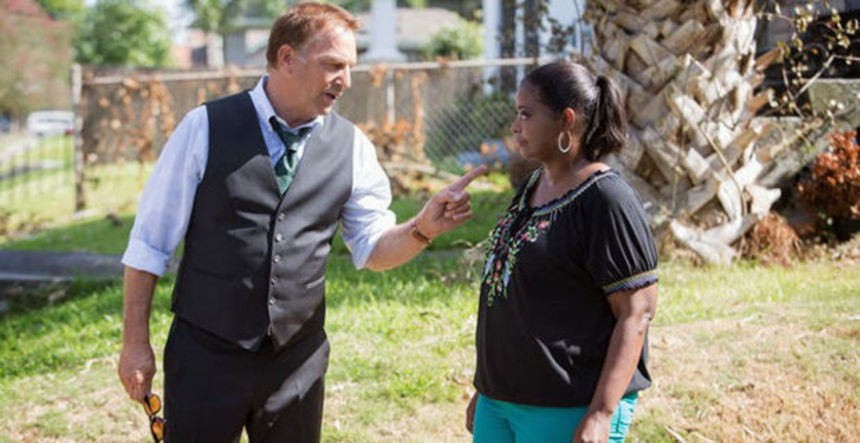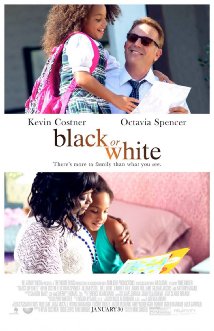Review: Kevin Costner's BLACK OR WHITE Is Anything But

And now, Black or White.
That's how Kevin Costner, who not only stars in, but financed this highly approachable light drama about contemporary race relations, is pitching the film. In his varied and overall successful career, Costner has pitched a number of things, mostly baseballs. But, as age has no doubt forced him to hang up the bat and mitt, the venerable actor has seen fit to seize upon his established white-bread, leading man persona, and go out on a limb... to play a grandfather. (!)
Eloise (Jillian Estell), his young granddaughter who's at constant risk of adorable-overload, is a bi-racial little girl whom Costner's character Elliot, and his wife, have been raising her whole life. It's been a very comfortable home for Eloise, as Elliot's clearly a man of success, if also a bit of an alcoholic. But when his wife dies (just before Act I begins), he's left alone to raise Eloise. Whether he can do it isn't the issue, but whether he should... That's entirely debatable.
Enter Rowena (Octavia Spencer), the mother of Eloise's biological father, who's chomping at the bit to ignite just such a debate. In court. Rowena expresses her belief that Eloise would do better being raised by her own genetic family, and to live among African-Americans. She brings in a no-nonsense family member / lawyer, played by rising star Anthony Mackie. The courtroom scenes are solid if also long-winded, delivering both the expected drama as well as a dash of comedy -- Rowena's outspoken antics almost get her thrown out by a black female judge -- as well as some admirably decent speechifying.

Like Elliot, Rowena is a self-made woman, and very much the matriarch of a very large extended family of children and grandchildren. Her professional ventures, however, are amusingly ramshackle, setting up shop for numerous businesses at once in her garage and elsewhere. But, she's got skill and wherewithal where it counts, and Spencer is perfect in the memorable role.
Where Black or White really gets interesting, though, is in the out-of-court relationship between Elliot and Rowena, something that plays as contentious-if-tolerable business as usual. Even after the legal hearings begin, Rowena's clan continues to crash Elliot's pool unannounced; Elliot still comes around to drop off Eloise; and instead of the expected heated words and yelling, it's frustrated wisecracks and bickering between the two.
Black or White is written and directed by Mike Binder, who worked with Costner once before on 2005's The Upside of Anger. According to Costner, the movie comes from a very personal place for the filmmaker. Dare I say, it shows. Although Binder's track record hasn't exactly been flawless, this is a sure-handed effort that transcends whatever feelgood platitudes its poster communicates. It arrives at the difficult balance of watchably breezy and deeply thought-provoking. In moments, I considered the notion that this could be Mike Binder's masterpiece, if there is to be such a thing.
Costner has hit the road to promote Black or White, making in-person stops in numerous cities, including my hometown of St. Louis, Missouri. Considering the distressing recent headlines to come out of St. Louis, and the very nearby town of Ferguson, one needn't overthink the reasons why Costner and company might think that promoting this film here was an apt choice. Fortunately, the actor took the high road in his post-screening Q&A session, not mentioning the very real strife St. Louis has been collectively dealing with. He did, however, mention Dances with Wolves and Field of Dreams a lot. (No mention of The Postman or Wyatt Earp, however.)
Black or White is a film that understands that there are no easy answers, and that even in 2015, we've all got a long way to go when it comes to accepting and understanding each other. It knows when to be funny, when to go melodramatic, when to expose the weaknesses of characters, and when to let them talk. Even if Eloise is perhaps too ideal a child -- the plot's demands of her being worth fighting for inadvertently back-burner her humanity at times; never is she belligerent or sassy -- the battle over her never feels contrived. Even her deadbeat father (played by Andre Holland), who wanders into the story late in the game, is a multi-dimensional character, probably as unsure of his own motives as the viewers are meant to feel. The final confrontation that erupts between them is a contrivance worthy of the best Old Hollywood melodramas.
As a middle-aged Midwestern white American, I can't say that I've been forced to confront the realities of racism the way that others different from myself likely have. But nonetheless, as an audience member, this film proved highly effective. (In fact, from a race relations perspective, I give it the edge over Selma.)
Although Black or White is made by other white Americans (Binder and Costner), they've tapped into a certain universalism that goes beyond liberal preachiness or white guilt. Whether it joins the pantheon of other beloved Costner films that he's been working so hard to associate it with remains to be seen. But rest assured, Black or White does deserve to be seen.

Do you feel this content is inappropriate or infringes upon your rights? Click here to report it, or see our DMCA policy.






